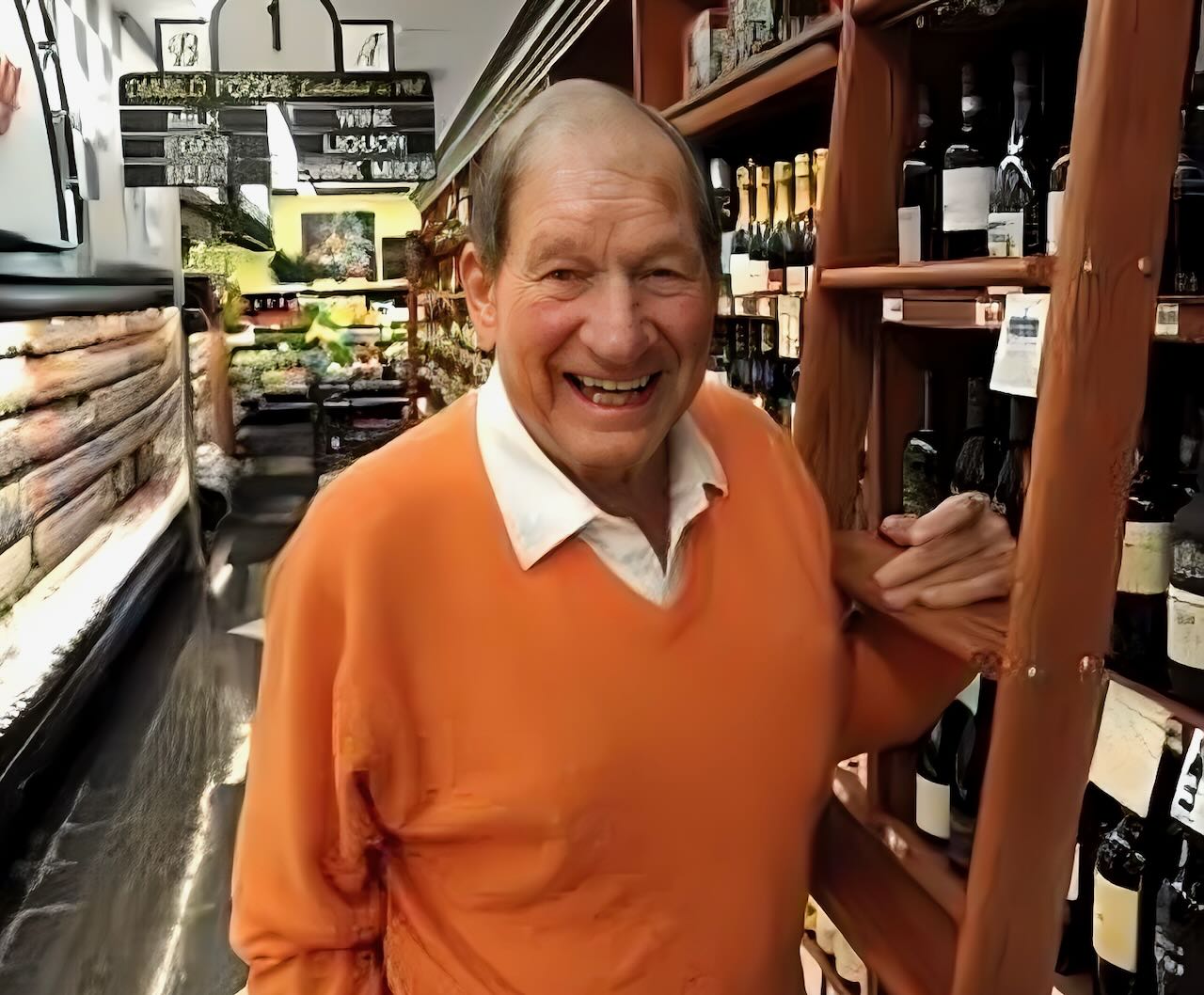Summary:
Ed Stokes was interviewed by Julie Sullivan in November 2004. He founded Diablo Foods in 1968, and 37 years later he was still working six days a week. In addition to operating the store, he was an active participant in and supporter of many Lafayette civic organizations, and was honored to be selected as the city’s Citizen of the Year and to be the only person named twice as Businessperson of the Year. Ed recounts the way his whole family had to work in the store during its early years, when various challenges had to be overcome.
Oral History:
Lafayette Businessperson and Citizen of the Year, Honorary Mayor, Rotary program chairman, Town Hall Theater president, Chamber of Commerce past president, and Northern California Grocery Association Hall of Fame member, Ed Stokes, owner of Diablo Foods, shows no signs of slowing down.
“I look forward each day to getting up and coming to the store,” Ed says. At age eighty-two, he still works six days a week. “I love the town and I love the store so much, and I love the customers and the employees.” The story of Ed’s success is grounded in hard work and unflinching determination.
In 1968, married with two teenage children, he mortgaged his house, went into debt to suppliers, and borrowed from friends in order to open Diablo Foods. “I knew I could do this,” he emphasizes. “I had run other people’s companies for them, and I knew what they were doing wrong. You can’t run a corporation on what the corporation wants, you have to sell the customer what they want.”
Soft-spoken, with hint of his native North Carolina in his drawl, Ed exudes confidence and interest in the people around him. It’s easy to understand why Percy Whitten, his first landlord, and subsequent creditors had a hard time telling him ‘no.’ “I used to knock on Percy’s door every day and say, ‘Percy, you’ve got to rent me that store.’ Percy kept saying no, because I didn’t have any money. I said, ‘I can make it if you just give me the lease.’ After a couple of months, Percy said, ‘I think you’re persistent enough to make this thing work.’”
Diablo Foods of Quality opened thirty-seven years ago. Ed emphasizes the quality in the store’s name as the main ingredient of its success. “We started with the very best quality and have kept it going.”
“The road’s been bumpy,” Ed admits, remembering the death of his partner in 1975. “We were on a shoestring, and I had to pay off his widow, then six months later, the store burned to the ground. Everything was gone. I still remember Bill Eames on the roof of his pharmacy next door, wetting it down with a hose.” At that time, Ed had already opened a second store in Danville, but while the Danville location was being remodeled, all those groceries were stored in Lafayette.
“Nobody ever knew what caused it. I think it was electrical. We were out of business nine months. But we put the store back, looking beautiful and gorgeous,” he recalls, “then it was 1989 (the year of the earthquake). After the earthquake, the food in the aisles was knee deep. At first we didn’t have lights, then we got a generator going. I put all the batteries in the front of the store so everybody who came for batteries got them free till we ran out. We worked all night, and our customers came down and helped us. We filled our garbage cans up with broken glass, then Jimmy Lucas of Lucas Paving came by with a huge dump truck, and we filled it completely. We worked all night long, and by nine the next morning we opened for business.”
Ed, who was born in Asheville, North Carolina, served in the Marine Corps in the Pacific in World War II. When he was released in 1946, he attended Mars Hill Junior College for two years. He and his wife, Betty, were married in 1948. Their son, Dan, is vice president of the corporation which owns the store, and their daughter, Connie Collier, is a merchandise manager.
Ed worked in the feed and seed business with his father-in-law for four years, but he dreamed of living in California. “I decided to enter the University of California (at Berkeley) and finish my business degree. I got a job at a U Save Center two blocks from campus and worked there through school. I worked full time and took twelve units from 1955 until I graduated in 1958. My family thought I was crazy.” Ed majored in personnel management. After graduation, he found “the big corporations wanted someone with a background in their business. My boss asked me to stay on and be the manager of the U Save store.” He eventually became grocery supervisor then general manager of the seven stores in the chain, one of which was in Lafayette.
“I had an opportunity to see a lot of locations, but I fell in love with Lafayette then and always have loved it here. It was a nice community, small, and seemed like the friendliest place that I’d ever been.”
After U Save was sold to Lee Brothers, Ed ran twenty-one stores. “We ran the store under U Save, then under Lee Brothers until the 60- store chain went bankrupt. I closed a few stores for Lee Brothers and the bankruptcy court, including the one here in Lafayette. It was on the site of Mrs. Jennie Bickerstaff’s home, which used to sit right on Mt. Diablo Boulevard. Percy Whitten bought the property when she passed away, tore down the house and built the store about 1965. (Ed installed a plaque on the redwood tree in the Diablo Foods parking lot commemorating the Bickerstaff family.)
After convincing Percy Whitten to lease him the store, Ed and his partner, Sal Vallelunga, opened Diablo Foods. “Getting merchandise was a big problem when we first started,” Ed remembers. “You have to buy from a wholesale grocery company. At that time I went to every wholesale grocery in Northern California, and they all turned me down flat. They thought the location was bad, because it wasn’t on a corner, and there were too many other stores in town. I found one guy who had an office in Union City. He worked for Associated Foods. They loaned me about $70,000 worth of groceries and gave me time to pay it back.
“Before we opened, Betty and I worked for two solid weeks to get the store cleaned. We did it in the daytime, because we didn’t have the electricity turned on yet. I went down to PG&E to turn the electricity on, and they said we had to pay in advance, anywhere from $3,000 to $5,000. Joe Brooks’ insurance put up a bond so I could get the electricity. When I went to the Board of Equalization to get a license to open, they wanted one month’s sales tax in advance. I had to borrow that money from friends.”
Ed and Betty commuted from Hayward the first year Diablo Foods opened. “I couldn’t move here right away, because I had mortgaged the house, and the bank wouldn’t let me sell it,” Ed says. “We opened the store at nine in the morning, and I checked groceries till nine at night, seven days a week. We had to stock the store and clean it up after and before we opened, so I worked 18-20 hours a day for over two years before I had a day off. You have to do that to get established. You can’t go out and hire a lot of people, or you’re not going to make it.
“My wife worked, too. She was right with me every day. She cooked food for the employees and helped buy groceries. I hired the best produce guy in Northern California and his son. He went to the market in Oakland every day and picked out the finest produce. We all worked together. In the beginning, we only had three in the grocery department and two in produce and three in the meat department. There were a lot more grocery stores in town in 1968 than there are today,” Ed says. “There were close to six or seven stores. Louis Stores was where Trader Joe’s is, and down where Pasta per Tutti and the TV shop are now was a grocery and meat market, then there were Safeway and Lucky, and the Pioneer Market was down where The Great Wall Chinese Restaurant is now.
“Before we took it over, the Lafayette store was the ugliest thing in the world. They had plastic butter dishes and ashtrays in their housewares department, terrible stuff. We’ve got quality merchandise. You don’t have to go to Walnut Creek any more to get high class merchandise. The people here are more conscious of quality foods, and they’re willing to pay for the better things. I could never put a store of this caliber somewhere where people wouldn’t support it.
“The most important thing in the store today is the perimeter, the meat, deli and produce,” Ed explains. “Even though we don’t have our own bakery, we have excellent bakery goods. It comes in fresh every day. Nobody has a salad bar like we do any more. It’s not a moneymaker. It’s something we do for the people. We don’t have a quick checkout lane, because nobody ever waits in our store,” he says emphatically. “The customer is supposed to put the groceries on the counter, but we still do most of that. We don’t want them to have to do anything, if we can help it. We really emphasize service. We’ve really done some crazy things. We’ve gone up so high, we’ve got little ladders for us to go up and get that stuff. The rent’s cheap up there. We sell more fresh turkeys than all the other stores put together. All we sell is Willie Birds. We’ve never felt any heat from the new stores that opened.”
Ed remembers what Lafayette was like before it incorporated in 1968. “Back then Lafayette was ugly. We had great big signs all over the place. I just paid $40,000 for a big sign where I put messages on what was happening in the community. The sign commission said those signs had to come down. Everybody was cynical about that, but look at how beautiful the city is today without those ugly signs all over the place. We began to feel a unity, one city rather than the whole Lamorinda community.”
Ed’s favorite restaurants were the Cape Cod, run by J. P. Estil (now Celia’s), and the Seafood Grotto. “Freddie’s Pizza was right on Mt. Diablo. El Charro is still there. There was a big lumber yard where Lafayette Park Hotel is, and where Big O Tires is, was a big building material place.
“I’m proud that the community has rewarded me,” Ed says. “Several years ago they had a contest among the service clubs for honorary mayor of Lafayette, and I raised more money than anybody else. The Rotary sponsored me, and the members stood out in front of the store and collected. All the money went to charity. In 2005, mayor Erling Horn gave me a plaque saying I’m still the honorary mayor, and I’ve got it down in my office. When the Northern California Grocery Association voted me into the Grocery Hall of Fame, I went in with the owner of Save Mart markets, that has 120 stores. A small store like ours. I’m proud of that.”
Excerpted from “Voices of Lafayette” by Julie Sullivan. This book is available for purchase in the History Room.



Leave a Reply